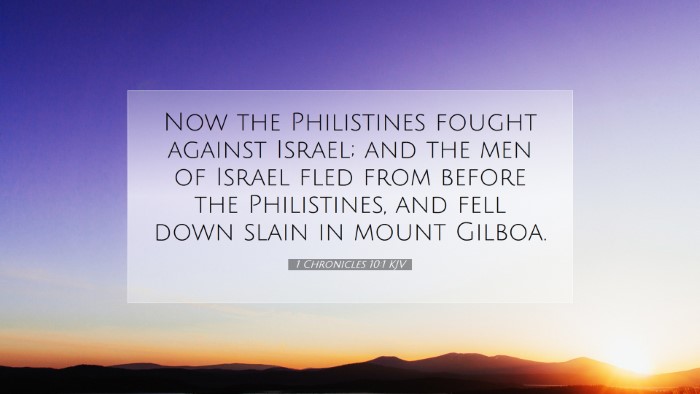Commentary on 1 Chronicles 10:1
1 Chronicles 10:1: "Now the Philistines fought against Israel; and the men of Israel fled from before the Philistines, and fell down slain in mount Gilboa."
Introduction
This verse sets the stage for one of the key events in Israel's historical narrative, capturing a critical moment in the relationship between the Israelites and the Philistines. The context of battle is prevalent, highlighting themes of conflict, defeat, and the consequences of leadership failures.
Contextual Overview
The first book of Chronicles is primarily concerned with chronicling the history of Israel, with a focus on David's reign. In this segment, the text reflects on the tragic defeat of Israel at Mount Gilboa, an event that not only impacted the military landscape but also had profound implications for the monarchy and the future of the nation.
Insights from Commentators
-
Matthew Henry
Matthew Henry emphasizes the significance of this battle and the sorrow that accompanies it. He notes that the Israelites fled in fear, which indicates not only the physical turmoil but also the spiritual state of the nation. He posits that the defeat was a divine judgment against King Saul and his disobedience to God. Henry warns readers to consider how personal failings can lead to national consequences.
-
Albert Barnes
Albert Barnes provides a detailed analysis of the geographical and historical context surrounding Mount Gilboa. He argues that the location was strategic, but the outcome of the battle signifies a turning point for Israel's military fortunes. Barnes comments on the psychological impact of fear as a significant factor in warfare, noting how it can lead to a swift collapse of morale among troops.
-
Adam Clarke
Adam Clarke delves into the spiritual implications of the Israelites' defeat. He reflects on the moral state of the nation and highlights Saul's failure to uphold God’s commandments as a critical reason for this catastrophe. Clarke underscores the idea that disobedience results in divine retribution, suggesting that this verse serves as a cautionary tale for future generations about the importance of faithfulness to God.
Theological Reflections
This verse carries profound theological ramifications, particularly regarding the nature of divine justice and the human experience in the face of adversity. The exile from divine favor showcased in this passage is indicative of a larger pattern woven through Scripture, where obedience to God correlates with His blessing, while disobedience leads to downfall.
The narrative also prompts questions about leadership and responsibility. As King Saul faced defeat, it became evident that his leadership failures had dire consequences for all Israel. This dynamic serves as a reminder to those in positions of authority within the church and community to lead with integrity and faithfulness.
Practical Applications
- Values of Leadership: Leaders must understand their decisions influence not only their lives but also the lives of those they lead.
- Fear and its Effects: The phenomenon of fear in a community can lead to significant consequences, emphasizing the need for strong faith in turbulent times.
- Divine Accountability: The passage highlights the necessity of submitting to God's will, serving as a reminder that personal actions can lead to corporate consequences.
- Encouragement in Defeat: Even when facing defeat, this story encourages readers to find hope in the larger narrative of God's plan for Israel, reminding them that God can turn even the worst situations into opportunities for redemption.
Conclusion
1 Chronicles 10:1 encapsulates a moment of despair in Israel's history, inviting readers to reflect on the intricate interplay of leadership, obedience, and divine judgment. Through the reflections of esteemed commentators like Matthew Henry, Albert Barnes, and Adam Clarke, we gain a deeper understanding of the implications of this text. It's an invitation for ongoing dialogue about the importance of aligning our actions with God’s teachings, the role of fear in our lives, and the hope that exists even amidst loss. As we navigate our own challenges, we are called to trust in God's sovereignty and learn from the past to build a faithful future.


